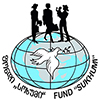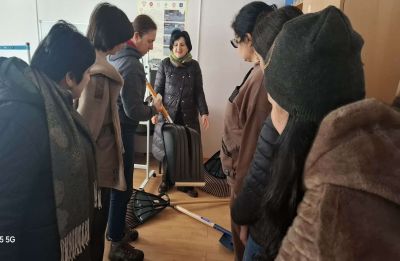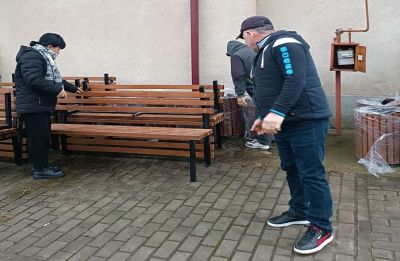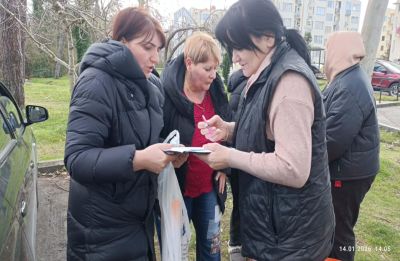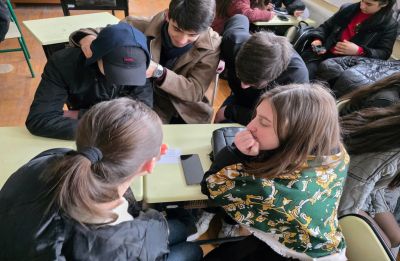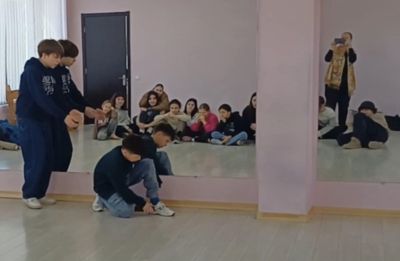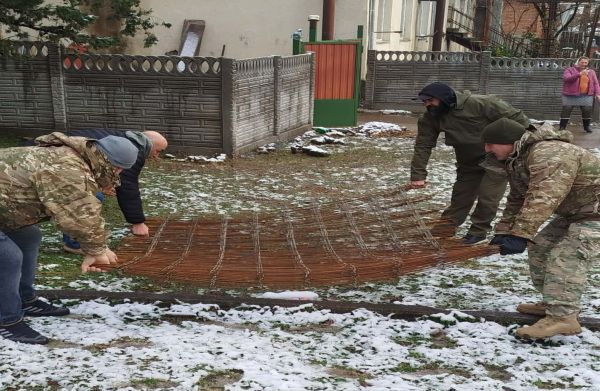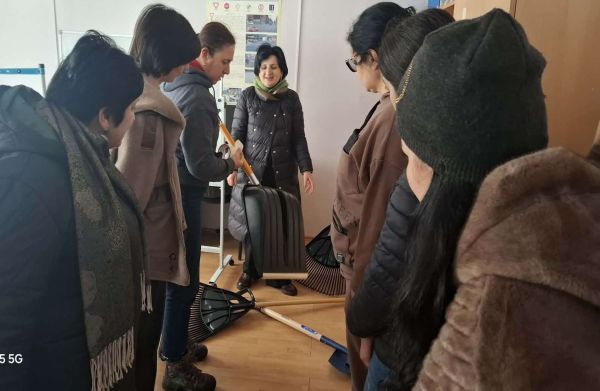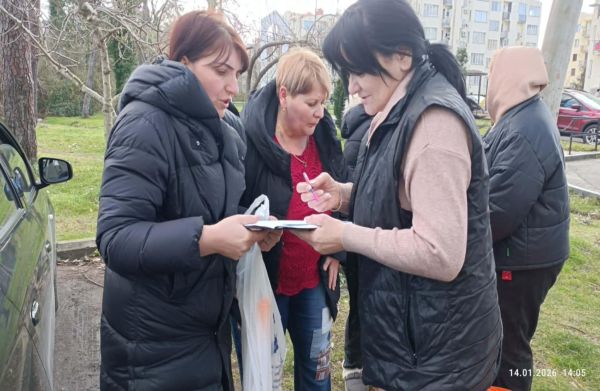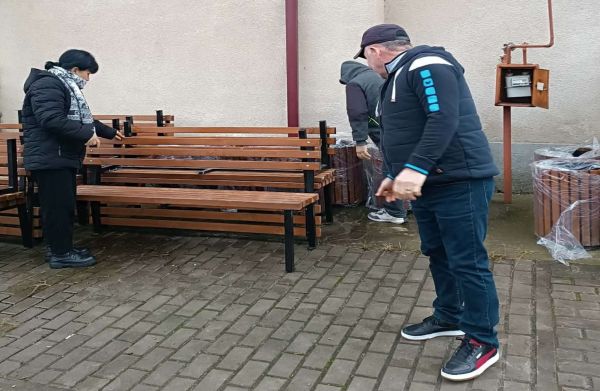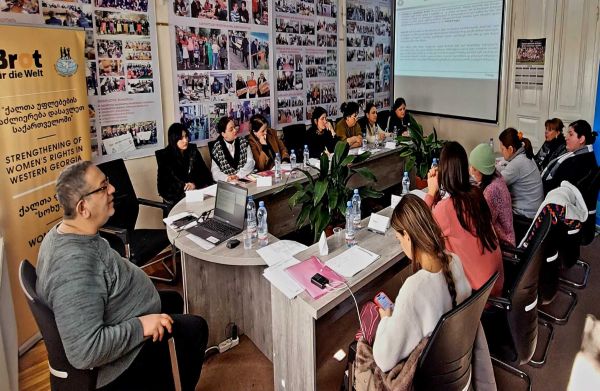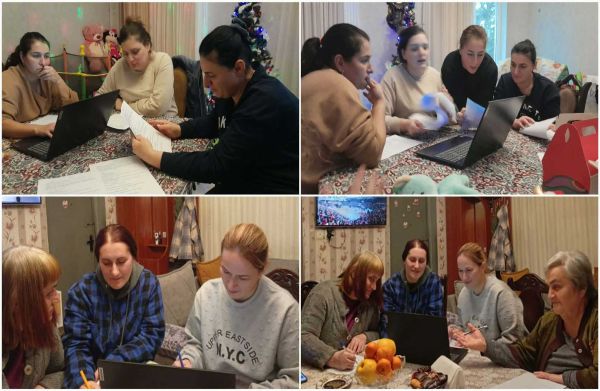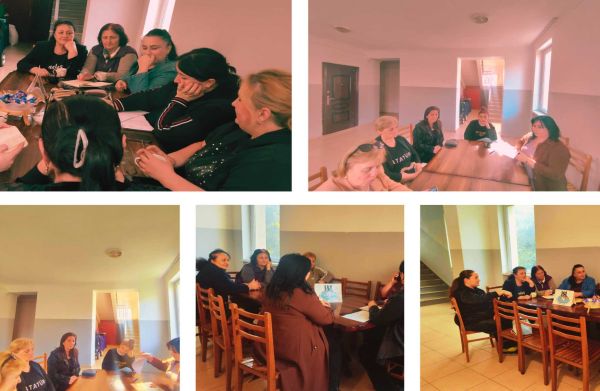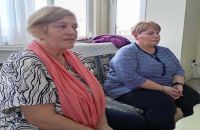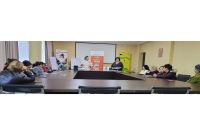In one of the IDP collective centers of Kutaisi, women's mutual assistance group initiates the rehabilitation of a playground. Our organization is providing financial support, and everyone—fathers, grandfathers—participates in the work. Soon, children will be able to play on this playground, and it will bring joy to everyone.
The project is implemented by a coalition of non-governmental organizations: the Association of IDP Women "Consent," the Women's Information Center, and Charity Humanitarian Women Fund “Sukhumi”.
The "Social House for Community Needs" initiative, presented by Senaki mutual assistance group, will soon be launched.
Small household appliances and garden tools are already purchased by group members for shared use as part of the initiative.
A Karcher high-pressure washing machine will completely replace the hand wash of carpets, cars, and other bulky items, making the work easier for women and men and improving the well-being of the community.
Tools needed for garden and yard improvement will help community members address common problems that have existed in the settlement for years.
The entire IDP community: women, men, and youth will benefit from the services of the “Social House”.
Members of the mutual assistance group have new ideas for the future related to expanding the functions of the “Social House”.
The project is implemented by a coalition of non-governmental organizations: the Association of IDP Women "Consent," the Women's Information Center, and Charity Humanitarian Women Fund “Sukhumi”.
Through the active work of Poti mutual assistance group, critical needs of the IDP settlement were identified. The women's initiative received financial support from our organization. As a result, the problem of stagnant water in basements will no longer bother residents – water pumps have been purchased for five buildings.
Additionally, cosmetic renovations to the entrances have begun, making the living environment much safer and more pleasant. By the end of the month, all necessary materials will be delivered, and the work will be completed in stages.
One of the key values of initiative is the active involvement of the local population. The IDPs themselves will improve the settlement and change the existing situation. This is a good example of how community unity and civic engagement can lead to real changes.
The project is implemented by a coalition of non-governmental organizations: the Association of IDP Women "Consent," the Women's Information Center, and Charity Humanitarian Women Fund “Sukhumi”.
Renovation of an old park on the territory of church and installation of benches and trash bins in the parks - these two initiatives, implemented by the women's mutual assistance group "Community Power" in Khoni IDP settlement, is coming to its end.
The funds requested for these civic initiatives are fully utilized, all necessary equipment is purchased, and community residents are awaiting good weather to begin work.
Amusement rides, benches, trash bins, and a lawn mower - the acquisition of all these items and the materials needed for their installation means the creation of comfortable open spaces and a cleaner environment.
As a result, the implementation of these initiatives will increase community engagement and their sense of responsibility for their own settlement.
The project is implemented by a coalition of non-governmental organizations: the Association of IDP Women "Consent," the Women's Information Center, and Charity Humanitarian Women Fund “Sukhumi”.
Two-day training on "Business Planning and Management of Small/Macro Businesses" was held at Women Fund “Sukhumi” office in Kutaisi.
Good business ideas don't usually come to entrepreneurs spontaneously. They are the result of painstaking work, effort, research, discussions, surveys, and often the entrepreneur's own creative thinking.
Therefore, the women listened attentively to the trainer: what can an inspiration for a good business idea? How can a successful business idea be developed?
Graduates from day centers of Chokhatauri, Senaki, Terjola, and Kutaisi were active participants of the training. They reflected on their own projects, calculated budgets, shared experiences, discussed the prospects of their future businesses...
The next stage will be a discussion of their business ideas.
The project is implemented with the support of the organization Brot
für die Welt - Evangelischer Entwicklungsdienst (Germany)
Kutaisi Mutual Assistance Group consists of active, determined women. They are committed to making life in IDP communities better, safer, and more comfortable. At the last meeting of the year, the group members discussed community initiatives:
- It's good that a barrier has been installed in the IDP settlement on Nikea Street. Everyone is happy and grateful.
-Interior and exterior work is currently underway. The lobby and exterior staircase are being painted. Moisture-damaged walls need to be cleaned and a ramp needs to be built.
The project is implemented by a coalition of Non Governmental Organizations: the Association of IDP Women "Consent," the Women's Information Center, and the Women's Charitable Humanitarian Fund “Sukhumi”.
Members of Tskaltubo mutual assistance group held their final meeting of the year and summarized their work:
"It's gratifying that we have resolved the problems in our settlements."
"Thanks to this project, we have established ourselves as community leaders and contributed to the resolution of specific problems."
During the meeting, initiatives were discussed, including the Kopitnari IDP community initiative, which has already received funding and is in the process of finalizing the technical details.
The project is implemented by a coalition of NGOs: the Association of IDP Women “Consent”, the Women's Information Center, and Women's Charitable Humanitarian Fund “Sukhumi”.
Poti mutual assistance group held its ordinary meeting. Participants discussed the 16-day campaign, its history and main goals, as well as the importance of awareness-raising and informing.
The group members noted that they will distribute thematic informational materials developed by the Women Fund “Sukhumi” in their communities and actively participate in awareness raising process. Participants also discussed community-based initiatives of mutual assistance group. The submitted applications were approved, and implementation will be completed by the end of December.
The project is implemented by a coalition of non-governmental organizations, including the Association of IDP Women "Consent," the Women's Information Center, and Women's Charitable Humanitarian Fund "Sukhumi."
Nino Khonelidze, head of Kutaisi Institution for Assistance to Victims of Human Trafficking and Violence under the State Agency for Assistance to Victims of Human Trafficking and Violence, was invited to Khoni mutual assistance group meeting.
The aim of the meeting was to inform group members about violence, promotion of prevention, and popularization of local and state services working for victims of violence.
Participants received answers to their questions and informational materials from the Fund “Sukhumi”.
The second part of the meeting was devoted to the topic of community initiatives. Members of the mutual assistance group heard information about the current status of the projects and when they will be able to begin implementing them.
The project is implemented by a coalition of non-governmental organizations: the Association of IDP Women “Consent” the Women's Information Center, and Women's Charitable - Humanitarian Fund “Sukhumi”.
